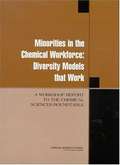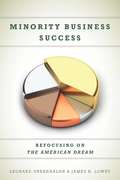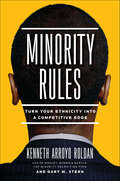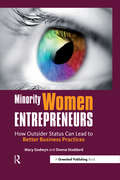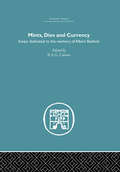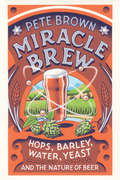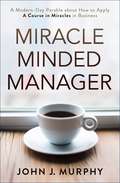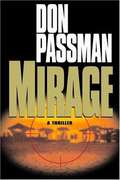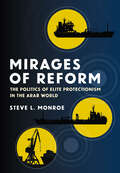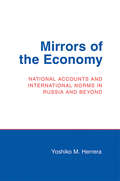- Table View
- List View
Minitab Cookbook
by Isaac NewtonThis practical cookbook covers a broad range of topics in an easy-to-understand manner. Step-by-step instructions guide you through even the most complicated of tools in Minitab. This book is great for anyone who is familiar with statistics and who wants to learn how Minitab works. Whilst you do not need to be an expert in all areas of statistics, you should understand the basics of the chapters you are interested in.
Minnetonka Corp.: From Softsoap to Eternity
by Adam Brandenburger Vijay KrishnaMinnetonka Corp. which was founded in 1964, began as a niche player in the gift soap and novelty toiletries markets. In 1980, it entered--and managed to capture a piece of--the mass bar-soap market with pump-dispensed Softsoap liquid soap. In 1984, the company took on the toothpaste market with plaque-fighting, pump-dispensed Check-Up. This time, success was more fleeting. Minnetonka launched the hugely successful Obsession fragrance in 1985, following up with Eternity in 1988. Minnetonka's various businesses were sold over the period 1987 to 1989. Analysis suggests that the key is the use of scope--starting a new game linked to an existing game in which rival players are already established. Analysis indicates that rivals may then deliberately choose to delay imitating the innovator if they view the innovation as: 1) sufficiently unlikely to succeed in the marketplace, and 2) sufficiently close a substitute to their existing products. A rewritten version of an earlier case.
Minorities in the Chemical Workforce: A Workshop Report to the Chemical Sciences Roundtable
by Chemical Sciences RoundtableThis report to the Chemical Sciences Roundtable presents a collection of contributed papers that report success stories for increasing diversity. The report provides background information on the value of diversity in the undergraduate environment, and the success stories address both undergraduate and graduate chemistry programs as well as chemical industry.
Minority Business Success: Refocusing on the American Dream
by Leonard Greenhalgh James H. LowryAuthors Leonard Greenhalgh and James Lowry chart a path for the full participation of minority businesses in the U.S. economy. Today, minorities are well on their way to becoming the majority of our workforce and a large part of our entrepreneurial endeavors; their full contribution is essential to national competitive advantage in a global economy. The beginning of this book summarizes demographic changes in America and shows why it's in the national interest to foster the survival, prosperity, and growth of minority-owned businesses. The authors outline why these businesses are vital to the solution to our current economic woes. Next, the book turns to what minority firms must do to take their place in major value chains, and, finally, the book examines what governments, corporations, and support organizations ought to be doing to foster minority inclusion. In total, Greenhalgh and Lowry lay out a new paradigm for developing minority businesses so that they can fully contribute to our national competitive advantage and prosperity.
Minority Rules: Turn Your Ethnicity into a Competitive Edge
by Kenneth Arroyo Roldan Gary SternIn a perfect corporate world, intellect, hard work, and professionalism would be recognized and rewarded regardless of the color of your skin. Kenneth Arroyo Roldan is here to tell you that nobody works in a perfect corporate world. Stellar performance alone will not determine corporate advancement—minorities need to learn and follow the rules of corporate politics. As one African American employee who started as a systems analyst at Xerox observed, "The reality was that despite your ability, if you weren't playing politics correctly, you would be derailed."In Minority Rules, Roldan gives a dose of tough love to minorities in corporate America while educating their majority counterparts. As the CEO of the top U.S. head-hunting firm specializing in placing minorities in fast track jobs, Roldan watched as minority superstars hired at Fortune 500 companies bailed out, disappointed and rejected after only a few years. The problem, Roldan says, is that minorities are not adequately prepared psychologically or culturally for corporate careers. In a six-step plan, he explains how to surmount the obstacles, play corporate hardball, and succeed as a minority in the workplace. Corporate culture is unforgiving to minorities, but it is possible to rise to the top with Roldan as your guide.With refreshing candor, Roldan prepares minorities both psychologically and culturally for corporate careers. Forget about using affirmative action and discrimination lawsuits to level the playing field. The only way to win is to know the landscape and master the rules of the game—from finding the right mentor to learning the art of networking to focusing on self-reliance, patience, and most of all, performance. Roldan shows minorities how to climb to the top jobs—and keep them.
Minority Women Entrepreneurs: How Outsider Status Can Lead to Better Business Practices
by Mary Godwyn Donna StoddardHow does gender and minority status shape entrepreneurial decision-making? This question seems long overdue since minority women in the US start new businesses at four times the rate of non-minority men and women. This book is about minority women entrepreneurs in the United States. Though these women are thriving as business owners, their stories are very seldom told, and few think of minority women as successful entrepreneurs. Therefore, the first purpose of the book is to give voice and visibility to US minority women business owners. The second purpose is to explain what makes these women different from the standard white male business owners most people are familiar with. Through in-depth interviews and first-hand accounts from minority women entrepreneurs, the authors found that, in innovative and exciting ways, minority women use their outsider status to develop socially conscious business practices that support the communities with which they identify. They reject the idea that business values are separate from personal values and instead balance profits with social good and environmental sustainability. This pattern is repeated in statistical evidence from around the globe that women contribute a much higher percentage of their earnings to social good than do men, but until now there was no clear explanation of why. Using sociological and psychological theories, the authors explain why women, especially minority women, have a tendency to create socially responsible businesses. The innovations provided by the women in this study suggest fresh solutions to economic inequality and humanistic alternatives to exploitative business policies. This is a radically new, socially integrated model that can be used by businesses everywhere. This book is intended for undergraduate and graduate students of business, sociology, race and gender studies as well as practitioners of entrepreneurship, aspiring entrepreneurs, and all those looking for new examples of holistic, sustainable and socially responsible business practices.
Mints, Dies and Currency: Essays dedicated to the memory of Albert Baldwin
by R.A.G. CarsonThe studies assembled in this volume are dedicated to the memory of Albert Baldein, a professional numismatist whose chief interest lay in helping other numismatists, professionals, students and collectors alike, some of whom record their appreciations here. The contributions, though they are drawn from a wide variety of fields - Greek, Roman, Dark Age, Byzantine, English, Scottish, Irish and European medieval coins, and medals - are all concerned with one or more facets of the theme set out in the title. Within the general concept, the essays deal with a diversity of subjects: * identification of mints * attribution of coins to specific mints* coinage current in particular periods* composition of groups of coins in a given series* establishment of the correct sequence of issues of such groups. The essays also demonstrate the use of particular numismatic techniques such as die-linking, the analysis of hoards and their statistics, the minute observation of changes in titulature and inscriptions and comparison of portrait styles. There is much new, exciting and well-illustrated material for numismatists, and chapters such as those on Scottish mints and Hadrian's COS III coins will be of interest to historians.
Mira a los ojos del lobo: Las 7 reglas de los equipos de éxito
by Mark DivineEl único líder del cambio eres tú. Tú eres quien debe transformarse. Y tú debes transformar también a tu equipo. ¿Estás al frente de un proyecto profesional y has visto cómo las hojas de ruta que garantizaban el triunfo quedaban obsoletas? En el nuevo campo de batalla donde nos hallamos hoy debemos aprender a enfrentarnos a los cambios rápidos y a la incertidumbre. La energía creativa que nos permitirá vencer surgirá de nuestro poder emocional y nuestra mentalidad. Ante ese reto, sin embargo, el lobo del miedo se interpone a menudo en nuestro camino. Ese lobo es una metáfora de los temores enraizados, los patrones negativos o los sesgos que nos bloquean emocionalmente y nos impiden disponer del apoyo de nuestro equipo al 100%. Este libro, en el que Mark Divine aplica al entorno profesional y empresarial su experiencia en los Navy SEAL, te ofrece los 7 principios de liderazgo la valentía, la confianza, el respeto, el crecimiento, la convergencia, la resiliencia y la excelencia- que te permitirán mirar a los ojos de tu propio lobo del miedo y superar los condicionantes negativos para evolucionar hasta alcanzar tu máximo. No hay otro modo de liberar tu verdadero y enorme potencial. Reseña:«Para alcanzar nuestra máxima capacidad en la vida y como líderes, debemos plantearnos grandes retos. Mark Divine lo ha hecho en incontables ocasiones y es la persona más indicada para ayudarte a abandonar tu zona de confort y transformar radicalmente lo que dabas por sentado.»Joe De Sena, fundador y CEO de Spartan
Miracle Brew: Hops, Barley, Water, Yeast and the Nature of Beer
by Pete BrownMost people know that wine is created by fermenting pressed grape juice and cider by pressing apples. But although it’s the most popular alcoholic drink on the planet, few people know what beer is made of. In lively and witty fashion, Miracle Brew dives into traditional beer’s four natural ingredients: malted barley, hops, yeast, and water, each of which has an incredible story to tell. From the Lambic breweries of Belgium, where beer is fermented with wild yeasts drawn down from the air around the brewery, to the aquifers below Burton-on-Trent, where the brewing water is rumored to contain life-giving qualities, Miracle Brew tells the full story behind the amazing role each of these fantastic four—a grass, a weed, a fungus, and water—has to play. Celebrated U.K. beer writer Pete Brown travels from the surreal madness of drink-sodden hop-blessings in the Czech Republic to Bamberg in the heart of Bavaria, where malt smoked over an open flame creates beer that tastes like liquid bacon. He explores the origins of fermentation, the lost age of hallucinogenic gruit beers, and the evolution of modern hop varieties that now challenge wine grapes in the extent to which they are discussed and revered. Along the way, readers will meet and drink with a cast of characters who reveal the magic of beer and celebrate the joy of drinking it. And almost without noticing we’ll learn the naked truth about the world’s greatest beverage.
Miracle Life, Inc.
by Lauren H. Cohen Christopher MalloyMiracle Life is a firm with a unique setup and organizational structure. Specifically, it is a network marketing firm (also known as multi-level marketing (MLM) firm), which utilizes a large distributor base, and depends on this individual distributor base to sell its products, giving explicit incentives for these individual distributors to both sell its products and sign up other distributors. The case gives students the opportunity to take the basic framework of Discounted Cash Flow (DCF) Analysis, and apply it to two unique perspectives of an identical problem. The students will then use this DCF approach to rationalize observed stock prices, connecting the two, and further reconciling how a company's future plan for growth, and the plausibility of this plan, has implications jointly for DCF and stock prices.
Miracle Medicines
by Robert L. ShookIt’s the business of saving lives. Miracle Medicines goes behind the scenes of the pharmaceutical industry and into the high-security laboratories to tell the stories of the men and women---chemists, physiologists, medical and clinical researchers, engineers---who have chosen to toil for years in the lab in order to transform scientific theories into new lifesaving medicines. You’ll witness the day-to-day labors, victories and defeats of the dedicated professionals who are waging a war against the diseases that still plague mankind. From the confines of their laboratories, these pharmaceutical adventurers explore unknown territories in health and science. Miracle Medicines reveals what really happens during the long and uncertain journey that each new drug and its creators must endure from theory, to research, to testing and, finally, FDA approval and delivery to the public. It’s a very human story within the context of fascinating scientific innovation. Through first hand interviews you’ll also meet the patients who benefit from these manmade miracles and learn how, within their bloodstreams, an ongoing battle is raging. The drugs profiled are: Advair: GlaxoSmithKline’s revolutionary asthma medication, the first packaged as both a control and emergency drug. Gleevec: The Novartis’ chronic myeloid leukemia treatment born from decades of medical research in a field of study that was once considered hopeless. Humalog: Eli Lilly’s reinvention of insulin to control diabetes has been described as being better than nature Lipitor: Pfizer’s miracle antidote for high cholesterol that was nearly lost to the pharmaceutical vaults and has since become the world’s top-selling medicine. Norvir: Abbott’s contribution to the fight against HIV that nearly erases all traces of the disease from the bloodstream and prolongs the life of patients. Remicade: Created for the treatment of Crohn’s disease, rheumatoid arthritis and other Immune Mediated Inflammatory Diseases, Johnson & Johnson’s revolutionary biomedicine was developed from technology that once was only found in science fiction. Seroquel: AstraZeneca’s treatment for both schizophrenia and bipolar mania that has given millions of psychiatrics a new lease on life. This compelling and truth-revealing book will forever change the way you view the medicines in your medicine cabinet, and the people who create them. .
Miracle Medicines
by Robert L. ShookIt's the business of saving lives. Miracle Medicines goes behind the scenes of the pharmaceutical industry and into the high-security laboratories to tell the stories of the men and women---chemists, physiologists, medical and clinical researchers, engineers---who have chosen to toil for years in the lab in order to transform scientific theories into new lifesaving medicines. You'll witness the day-to-day labors, victories and defeats of the dedicated professionals who are waging a war against the diseases that still plague mankind. From the confines of their laboratories, these pharmaceutical adventurers explore unknown territories in health and science. Miracle Medicines reveals what really happens during the long and uncertain journey that each new drug and its creators must endure from theory, to research, to testing and, finally, FDA approval and delivery to the public. It's a very human story within the context of fascinating scientific innovation. Through first hand interviews you'll also meet the patients who benefit from these manmade miracles and learn how, within their bloodstreams, an ongoing battle is raging. The drugs profiled are: Advair: GlaxoSmithKline's revolutionary asthma medication, the first packaged as both a control and emergency drug. Gleevec: The Novartis' chronic myeloid leukemia treatment born from decades of medical research in a field of study that was once considered hopeless. Humalog: Eli Lilly's reinvention of insulin to control diabetes has been described as being better than nature Lipitor: Pfizer's miracle antidote for high cholesterol that was nearly lost to the pharmaceutical vaults and has since become the world's top-selling medicine. Norvir: Abbott's contribution to the fight against HIV that nearly erases all traces of the disease from the bloodstream and prolongs the life of patients. Remicade: Created for the treatment of Crohn's disease, rheumatoid arthritis and other Immune Mediated Inflammatory Diseases, Johnson & Johnson's revolutionary biomedicine was developed from technology that once was only found in science fiction. Seroquel: AstraZeneca's treatment for both schizophrenia and bipolar mania that has given millions of psychiatrics a new lease on life. This compelling and truth-revealing book will forever change the way you view the medicines in your medicine cabinet, and the people who create them.
Miracle Minded Manager: A Modern-Day Parable about How to Apply A Course in Miracles in Business
by John MurphyReaders witness fictional company president Jack MacDonald use the wisdom from A Course in Miracles to transform his company and relationships beyond anything he could ever imagine.Written in story form, Miracle Minded Manager approachably integrates the lessons author John J. Murphy has learned in both his personal and professional life since first learning about A Course in Miracles in 2008. Murphy credits the Course for accelerating his growth and prosperity and quadrupling his business revenues within two years, and now you, too, can benefit from the blending of lessons from A Course in Miracles and Murphy&’s modern-day training. Jack MacDonald, president of TYPCO, is trying to transform his company. He&’s hit a roadblock with unhelpful and defensive direct reports and ingrained systems of doing business that no longer serve. Unsure of how to continue, he turns to business consultant Jordan Mckay, who has helped Jack with management challenges in the past. Jack is surprised that instead of suggesting practical business tactics, Jordan encourages him to adopt A Course in Miracles to open his mind and let go of ego. Though at first, he&’s reluctant, Jack and his wife, Judy, begin to follow the Course. The results are life changing.
Miracle for Whom?: Chilean Workers Under Free Trade (New Political Economy Ser.)
by Janine BergMiracle for Whom? offers a fresh and insightful perspective to the debate on rising income inequality in Chile, and on the broader question of how free trade affects the demand for workers in developing countries.
Miraculous Growth and Stagnation in Post-War Japan (Routledge Studies in the Modern World Economy)
by Gustav Ranis Keijiro Otsuka Koichi Hamada Ken TogoThis volume examines different aspects of the Japanese experience in a comparative context. There is much here of relevance to contemporary developing countries anxious to initiate the experience of miraculous growth and anxious to avoid the subsequent stagnation. Such issues of the role of government in providing the right amount of infant industry protection, the relevance of the financial system, the country’s peculiar corporate structure and the role of education in a comparative context serve to illuminate the lessons and legacies of this unique experience in development. The relationship between various dimensions of its domestic policy experience and Japan’s international experience in trade promotion and foreign aid is explored and is of special interest to an international audience of academics and policymakers.
Mirae Asset: Korea's Mutual Fund Pioneer
by Michael Shih-ta Chen G. A. Donovan Mukti KhairePark Hyeon-Joo, the founder and Chairman of Korea's earliest and largest mutual fund company, plans to expand internationally. After first offering emerging market funds to his Korean customers, the company then began selling local-currency funds in India and Brazil. Now he has to decide his next steps. Should he build on his emerging market expertise and focus his business expansion in developing countries? If so, where should he concentrate his efforts -- India, Brazil, China, or other countries? Or should he instead focus on expanding into developed markets through operations in New York and London?
Mirage
by Don PassmanA mental whiz who runs a cyber-encryption company, John Berger is at the top of his game and sure that all his hard work will soon pay off. After playing in a two-day chess tournament, he arrives at work to find his office building bombed and several people killed. When questioned by the police, he explains he was playing chess at the time of the explosion. Then comes a greater shock ("the police tell him the chess tournament never took place.
Mirages of Reform: The Politics of Elite Protectionism in the Arab World
by Steve L. MonroeIn Mirages of Reform, Steve L. Monroe argues that geopolitics and social connections between state and capital underpin the Arab world's uneven trade policies. Despite decades of international pressure, neoliberal trade policy reform in the Arab world has been varied, selective, and often ineffective. Neoliberal trade policies have not deepened international trade in many of the region's markets. This book explains why.When the region's regimes have strong support from global powers and strong social connections to the industrial elite, they engage in extensive but deceptive trade policy reform. Behind an edifice of neoliberal trade policies, neopatrimonial forms of protectionism like tax evasion and noncompetitive procurement shield the socially connected from international competition and obstruct actual trade liberalization. Industrialists are less trustful of regime promises of neopatrimonial protectionism after reform when they have weak social connections to their regime and their regime has low support from global powers. They are more likely to defend existing protectionist policies under these conditions, resulting in less trade policy reform. Drawing on interviews, firm- and industry-level data, and evidence from Jordan to Morocco, Mirages of Reform reveals how international and domestic factors interact to shape the Arab world's rugged trade policy terrain. Insightful and well researched, this book imparts important lessons and warnings about the repercussions of economic reform in the region.
Miranda's Waning Protections: Police Interrogation Practices after Dickenson
by Welsh S. WhiteDid the Supreme Court's upholding of Miranda in 2000 adversely impact law enforcement, as conservatives have complained, or was it a reaffirmation of individual rights? Welsh S. White looks at both sides of the issue, emphasizing that Miranda represents just one stage in the Court's ongoing struggle to accommodate a fundamental conflict between law enforcement and civil liberties, and assessing whether the Court's present decisions (including Miranda) strike an appropriate balance between promoting law enforcement's interest in obtaining reliable evidence and the individual's interest in being protected from overreaching police practices.
Mirassou Vineyards (A)
by D. Daryl WyckoffExamines the decision by Mirassou to test a mechanical grape harvester that requires a major change in growing methods and operations. The machine is unproven and the investor has asked this vineyard to test it for him and commit to use it.
Mireles, el rebelde
by J. Jesús LemusMireles, el rebelde es un ensayo periodístico inédito donde Jesús Lemus, autor de Los malditos, construye un perfil del fundador de las autodefensas en México: José Manuel Mireles. En esta obra el autor desarrolla de forma analítica e informada su visión sobre José Manuel Mireles, fundador de las autodefensas en las zona de Michoacán y Guerrero, que sin duda nos ayudará a entender mejor el grave conflicto que se vive en esa zona de México y enriquecerá la discusión acerca de la seguridad nacional y la lucha contra el narcotráfico.En estas páginas el autor describe el momento y las circunstancias que orillaron a los habitantes de las zonas de Guerrero y Michoacán a levantarse en armas liderados por la iniciativa del Doctor Mireles. Sin caer en apologías adulatorias, el autor cuenta paso a paso el desarrollo de un malestar social generalizado que se convirtió en iniciativa de cambio social. El conflicto de las autodefensas en Michoacán es un tema de gran importancia en el ámbito nacional e internacional con repercute en temas como la violencia, la seguridad y el narcotráfico, y es por ese motivo que este ensayo encuentra una importancia fundamental para entender esta situación.
Mirror Mirror: Creating the Need for Change-Starting the Journey to Transformative Growth Through the Empowerment of Frontline Employees
by Vineet NayarWhen it comes to transforming your business for profitable growth, where do you begin? For CEO Vineet Nayar, who took the reins of IT services giant HCL Technologies in 2005, it began with an honest look in the corporate mirror. Although HCLT had surpassed $700 million in annual revenue and had a good track record of growth, it had begun to lose market share and, worse, mindshare-some of the company's most talented employees were leaving to work for competitors. In this chapter, Nayar describes what he calls the "Mirror Mirror" approach that set HCLT on the road to change. By communicating openly with employees and challenging them to acknowledge the reality of their company's trailing position, Nayar was able to clarify that the "value zone" of the company lay not in its array of technologies, but in the work of his frontline employees who, in their daily interactions, created customer value. In a bold move, he turned the corporate hierarchical pyramid upside down, making management accountable to those in the value zone instead of the other way around. The result was a complete transformation-and one that turned out to be both profitable and sustainable. This chapter was originally published as Chapter 1 of "Employees First, Customers Second: Turning Conventional Management Upside Down."
Mirrors of the Economy: National Accounts and International Norms in Russia and Beyond (Cornell Studies in Political Economy)
by Yoshiko M. HerreraAs international institutions multiply and more governments sign on to standardized ways of organizing economies and societies, resistance to globalization persists. In Mirrors of the Economy, Yoshiko M. Herrera explores the variance in implementation of international institutions through an examination of the international System of National Accounts (SNA) and, in particular, the success of post-Soviet Russia and other formerly communist countries in implementing the SNA. The SNA is the basis for all national economic indicators, including Gross Domestic Product, and is therefore a critical institution for economic policy and development. Herrera tests existing theories of implementation of international institutions and proposes a novel theoretical concept, "conditional norms," to suggest that the conditions attached to norms may result in institutional change. On the basis of content analysis of statistical publications and more than seventy-five interviews throughout Russia—particularly in Moscow—and in Washington, she forms a clear picture of the implementation of the SNA in Russia in the early 1990s. In Soviet times a stable conditional norm delineated the appropriateness of statistical institutions based on the structure of the economy. The transformation of the economic system triggered a shift in support among Russian and Eastern European statisticians in favor of the SNA. Herrera's argument increases our understanding of the role of norms, structural conditions, and professional communities in institutional implementation.


